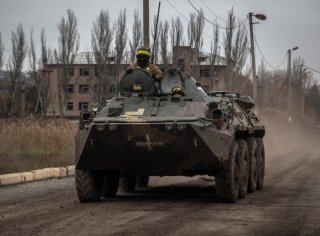Pentagon: Russian Invasion of Ukraine a ‘Massive Strategic Failure’
U.S. undersecretary of defense for policy Colin Kahl suggested that Russian forces had “probably lost half of their main battle tanks” during the war.
U.S. undersecretary of defense for policy Colin Kahl announced on Tuesday that the Russian military had lost more than half of its main battle tanks during its ongoing invasion of Ukraine, describing the war as a “massive strategic failure” and asserting that the Kremlin would be far weaker after the conflict ended.
During a scheduled press briefing, Kahl suggested that Russian forces had “probably lost half of their main battle tanks” during the war, which is now in its ninth month. He observed that these losses could not be easily replaced by the Russian military, noting that the country would consequently “emerge from this war weaker than it went in.”
Kahl assigned much of the blame for the disaster to Russian leader Vladimir Putin, who he said had ordered the invasion of Ukraine in order to “extinguish” the country’s independence. The undersecretary emphasized that the fight in Ukraine had global ramifications, chiefly regarding the consequences of the use of military force around the world. He noted that most nations had participated in an international order since 1945 that did not allow for the invasion and annexation of other nations’ territory, a key cause of World War II and consequently a major prohibition in the United Nations Charter.
“We don’t want to live in a world where big countries believe that they can swallow up their smaller neighbors,” he said. “That is a recipe for global disaster and large countries going on the march. We’ve lived in a world like that before: it was called the 1930s, and it ended in the most catastrophic global conflict in human history. … We don’t want to live in a world where the rules of the international system are torn up.”
Kahl also discussed events on the battlefield, including Moscow’s recent decision to retreat from the city of Kherson across the Dnieper River and allow Ukraine to recapture the provincial capital without a major battle. He claimed that the Russian military was “repositioning their forces in some ways that could be interpreted as providing cover for an orderly withdrawal.” He compared the early stages of organized withdrawal in Kherson to the Russian military’s disorganized retreat from the northern city of Kharkiv. Hundreds of Russian soldiers stationed in Kharkiv were captured and substantial quantities of military equipment—including several Russian T-90 main battle tanks—were captured by Ukrainian forces.
However, Kahl noted that many Russian soldiers remained in Kherson and on the eastern bank of the Dnieper, suggesting that observers would still “have to see how [the withdrawal from Kherson] plays out” before declaring a premature victory for Ukraine.
Trevor Filseth is a current and foreign affairs writer for the National Interest.
Image: Reuters.

